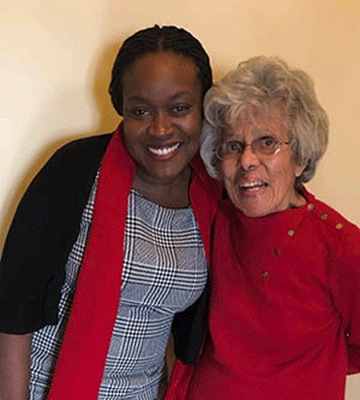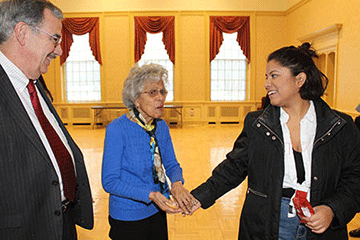Tribute to a groundbreaking educator
05/14/2024

Marjorie Dey Carter ’50, who died on April 25, 2024, at age 97, didn’t set out to be a pioneer. But as the first African American teacher in the Syracuse (N.Y.) City School District, it was inevitable.
Dey Carter’s illustrious, 40-year career influenced education on a state and national level, earned prestigious accolades and took her around the world. This began, however, with a desire to be like her own sixth-grade teacher, who had brought wildflowers into the classroom for discussion.
“I liked that and wanted to do that someday. Teachers never know what gets implanted and stays with a child forever,” Dey Carter told a Syracuse Post-Standard reporter in 2012 when she received the Mary Ficchi Lifetime Achievement Award from advocacy group Parents for Public Schools. “Truly, you don’t know what will spark something in a child at any age.”

Born and raised in Syracuse, N.Y., as the only child in a family with deep historical roots there, Dey Carter spent summers on the family farm in Navarino, a rural area southwest of the city. Music and the arts were her main interests, and she was an avid reader from an early age.
Dey Carter — a past president of the SUNY Cortland Alumni Association, a 1977 SUNY Cortland Distinguished Alumna and a former Cortland College Foundation board member — was the only African American student during her first two years at SUNY Cortland in the late 1940s. She credited three professors with best preparing her to become an outstanding teacher: Ruth Dowd, Olive Fish and Alice Pierce.
In 1950, as a newly minted graduate with certification to teach grades one through eight, she became the first African American teacher in the Syracuse City School District.

In early 2020, SUNY Cortland President Erik J. Bitterbaum, left, met with campus community and alumni participants in the Beloved Community Narratives Project, including Dey Carter, center, and Cesia Roman '20.
Dey Carter proved to be a visionary and innovative educator. After teaching first and second grades, she became an instructional specialist implementing programs supported by federal funding targeted to help inner city children in Syracuse, a city with one of the nation’s worst child poverty rates. Her last assignment was in 1990 at Edwin Weeks Elementary, an experimental school on Syracuse’s North Side.
In the Syracuse Post-Standard article, she also was described by Bob Gardino, vice president of Parents for Public Schools, as “a joyous, positive person and those attributes spilled over into her work with students and other teachers.”
A CNYCentral.com article promoting Teacher Appreciation Day captured Dey Carter’s comment in a profile: “Even if you didn’t like the teacher, you probably learned from him or her.”Past presidents Morgan and Carter
Dey Carter embraced team teaching, a novel concept at the time that promised to foster greater success in the classroom. She worked with colleagues to build and develop new lesson plans and introduce new methods and materials.
“It made it possible for teachers to share ideas and work together,” she once recalled.
During the summer months, she conducted a teacher-training program for adults at Syracuse University.
In 1972, Dey Carter became the first African American woman to serve as president of the Syracuse Teachers’ Association. Active in education on the state and national levels, Dey Carter served as a delegate to both the New York State Teachers Retirement System and the New York State United Teachers.
She became a board member of the Association of Childhood Education, the only national organization focused on teachers’ issues at the time.
As a delegate to the National Education Association (NEA), she traveled to Lesotho, South Africa, to represent the organization at a teacher’s seminar. In 1973, she was among the first group of American educators to visit China as guests of that country’s government.
Dey Carter was a member of Delta Kappa Gamma International, an education honorary for women educators, and was recognized with an Association of Black Educators’ Distinguished Service Award.
Her retirement from the Syracuse City School District in 1990 after 40 years of service launched a long second career spent educating and assisting the broader community and reconnecting with her beloved alma mater.
Her volunteer service included quarter-century stints as a docent for the Everson Museum of Art — she received its Exemplary Service Award — and on the leadership team of the Salvation Army Women’s Auxiliary.Passing the torch
Her many accolades included the Post-Standard Woman of Achievement Award for contributions to the local community, and she was named a statewide Woman of Distinction in 2021. The Onondaga Women’s Political Caucus named Dey Carter a “Great Leader” in 1993 for her leadership role, community involvement, and dedication to providing quality education for all children. Fittingly, the Black Leadership Congress of Syracuse bestowed upon her its Pioneer Award. The Syracuse Onondaga NAACP in 2022 created in her honor the Marjorie Carter Scholarship Initiative, benefitting college-bound, local high school seniors.
In 2000, Dey Carter endowed SUNY Cortland’s Marjorie Dey Carter ’50 Scholarship in Urban Education, a renewable, $2,000 award to benefit outstanding students who are enrolled in the university’s urban teacher education program.
Her former Theta Phi, Alpha Chapter sorority sisters from the classes of 1947-53 created the Marjorie Dey Carter ’50 Scholarship for a SUNY Cortland junior or senior education major who has demonstrated outstanding leadership qualities.
A longtime volunteer for the SUNY Cortland Alumni Association, Dey Carter served as president of its board of directors from 1998 to 2000 and received its highest honor, Distinguished Alum, in 1977.Beloved Community Narratives Project
Dey Carter’s kind and gentle example represented the best of SUNY Cortland. In 2019, she donned a flamboyant red hat and sat for a professional portrait that, combined with her personal story, was the basis for inclusion among 25 Beloved Community Narratives Project posters commissioned by the Institutional Equity and Inclusion Office. The posters adorn campus public areas and hers can be found at the Student Life Center.